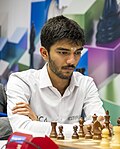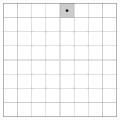Portal:Chess
Introduction
Chess is a board game for two players. It is an abstract strategy game that involves no hidden information and no elements of chance. It is played on a square board consisting of 64 squares arranged in an 8×8 grid. The players, referred to as "White" and "Black", each control sixteen pieces: one king, one queen, two rooks, two bishops, two knights, and eight pawns, with each type of piece having a different pattern of movement. An enemy piece may be captured (removed from the board) by moving one's own piece onto the square it occupies. The object of the game is to "checkmate" (threaten with inescapable capture) the enemy king. There are also several ways a game can end in a draw.
The recorded history of chess goes back to at least the emergence of chaturanga—also thought to be an ancestor to similar games like xiangqi and shogi—in seventh-century India. After its introduction in Persia, it spread to the Arab world and then to Europe. The modern rules of chess emerged in Europe at the end of the 15th century, with standardization and universal acceptance by the end of the 19th century. Today, chess is one of the world's most popular games, with millions of players worldwide.
Organized chess arose in the 19th century. Chess competition today is governed internationally by FIDE (Fédération Internationale des Échecs), the International Chess Federation. The first universally recognized World Chess Champion, Wilhelm Steinitz, claimed his title in 1886; Gukesh Dommaraju is the current World Champion, having won the title in 2024. (Full article...)
Selected article -
Garry Kimovich Kasparov (born Garik Kimovich Weinstein on 13 April 1963) is a Russian chess grandmaster, former World Chess Champion (1985–2000), political activist and writer. His peak FIDE chess rating of 2851, achieved in 1999, was the highest recorded until being surpassed by Magnus Carlsen in 2013. From 1984 until his retirement from regular competitive chess in 2005, Kasparov was ranked the world's No. 1 player for a record 255 months overall. Kasparov also holds records for the most consecutive professional tournament victories (15) and Chess Oscars (11).
Kasparov became the youngest undisputed world champion in 1985 at age 22 by defeating then-champion Anatoly Karpov, a record he held until 2024, when Gukesh Dommaraju won the title at age 18. He defended the title against Karpov three times, in 1986, 1987 and 1990. Kasparov held the official FIDE world title until 1993, when a dispute with FIDE led him to set up a rival organisation, the Professional Chess Association. In 1997, he became the first world champion to lose a match to a computer under standard time controls when he was defeated by the IBM supercomputer Deep Blue in a highly publicised match. He continued to hold the "Classical" world title until his defeat by Vladimir Kramnik in 2000. Despite losing the PCA title, he continued winning tournaments and was the world's highest-rated player at the time of his official retirement. Kasparov coached Carlsen in 2009–2010, during which time Carlsen rose to world No. 1. Kasparov stood unsuccessfully for FIDE president in 2013–2014. (Full article...)
General images
Selected image
FIDE world ranking
| Rank | Player | Rating |
|---|---|---|
| 1 | 2837 | |
| 2 | 2804 | |
| 3 | 2782 | |
| 4 | 2777 | |
| 5 | 2776 | |
| 6 | 2767 | |
| 7 | 2767 | |
| 8 | 2766 | |
| 9 | 2758 | |
| 10 | 2757 | |
| 11 | 2749 | |
| 12 | 2748 | |
| 13 | 2746 | |
| 14 | 2745 | |
| 15 | 2743 | |
| 16 | 2742 | |
| 17 | 2739 | |
| 18 | 2738 | |
| 19 | 2736 | |
| 20 | 2736 |
Top 10 WikiProject Chess Popular articles of the month
Did you know...
No recent additions
Reviewed articles
Chess from A to Z
| Index: | A B C D E F G H I J K L M N O P Q R S T U V W X Y Z (0–9) |
| Glossary: | A B C D E F G H I J K L M N O P Q R S T U V W X Y Z |
Topics
Subcategories
Related portals
Related WikiProjects
Associated Wikimedia
The following Wikimedia Foundation sister projects provide more on this subject:
-
Commons
Free media repository -
Wikibooks
Free textbooks and manuals -
Wikidata
Free knowledge base -
Wikinews
Free-content news -
Wikiquote
Collection of quotations -
Wikisource
Free-content library -
Wikiversity
Free learning tools -
Wiktionary
Dictionary and thesaurus

















































































